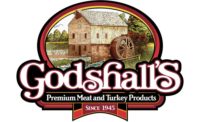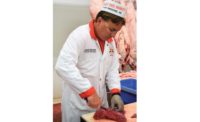2016 Independent Processor of the Year: Western’s Smokehouse
Over the last decade, this Missouri processor has reinvented itself as a leading snack stick manufacturer.

Western’s Smokehouse has kept its original storefront, but the expanded 50,000-square-foot facility is a far cry from the original 2,000-square-foot location.
Photos by MESG Photo

Three generations of award-winning meat processors: Sam, Kevin and Leighton Western.
Photos by MESG Photo

Western’s Smokehouses produces and packages upwards of a quarter of a million snack sticks per day.
Photos by MESG Photo

Each rope of uncut snack sticks is about 51 inches long before being cut to their 7-inch size. The remaining ends are packaged and sold at the retail store.
Photos by MESG Photo

Kevin Western estimates that the company produces more than 100 varieties of meat sticks, including private label customers.
Photos by MESG Photo

Sam Western (left) may have started the business, but Western’s Smokehouse is truly a family affair. Along with his wife Dianne and son Dan (not pictured), Kevin and Heather Western and Leighton and Bryanna represent the three generations active in the business.
Photos by MESG Photo

Sam Western, left, gives son Kevin an early introduction to meat processing in this early photo.
Photos by MESG Photo

From its start as a small market and custom processor, Western’s Smokehouse has gained a large and loyal customer base.
Photos by MESG Photo

Sam Western jokes that he started Western’s Smokehouse with four old pieces of equipment and a lot of grit. This picture from the company’s early days shows the original building, before its many expansions.
Photos by MESG Photo

Western’s Smokehouse now has a 50,000 square-foot facility in Greentop, Mo.
Photos by MESG Photo

Western’s Smokehouse exterior sign promotes it meat sticks and Wisconsin cheeses.
Photos by MESG Photo

Kevin Western next to ropes of uncut snack sticks.
Photos by MESG Photo

Sam Western, founder, Western’s Smokehouse
Photos by MESG Photo

Sam Western inside the plant.
Photos by MESG Photo

7-inch cut snack sticks.
Photos by MESG Photo















Today, Western’s Smokehouse of Greentop, Mo. is known as a premier manufacturer of meat snack sticks. With a growing branded presence and a long list of private label customers, the company’s meat sticks can be found across the country. Naturally, the company has a great deal of expertise on the subject, but it wasn’t always that way. In fact, Kevin Western jokes that when he first got involved with the product, he thought shelf-stable snack sticks were made just by adding something to the meat.
“I called up a seasoning company and said, ‘What ingredient do you add to make a shelf-stable meat snack?’ and they said, ‘Well, there’s not,’” he recalls, laughing.
Western’s Smokehouse has come a long way in a relatively short time. Over the course of the last decade, the company has stopped custom processing and deer processing, shifting its focus into shelf-stable meat snacks. It has expanded its facility several times, became SQF certified and launched its own branded line of Western’s Smokehouse snack sticks. The company’s reinvention has made it a top company in the growing meat snack sector.
Founder Sam Western marvels at the changes the company has made. He founded the company in 1978 with, he notes, “four walls and four pieces of worn-out equipment — and a lot of grit.
“We never dreamed we’d ever be doing what we’re doing, but I’m happy about it,” he adds, crediting his son Kevin, the chief operating officer, for taking the business to the next level.
The company moved away from slaughtering and processing in 2007 and 2008, expanding and reconfiguring the operation as its focus changed. Sam admits that removing the rails from the deer processing room was a bittersweet moment, as it represented the end of an era in his career. It was, however, the evolution that the company needed to make.
“I think so many times small businesses put their blinders on,” Kevin says. “[They say] ’We’ve always done this, we’ve always done that,’ and they’re afraid to make changes. It is scary whenever you’ve slaughtered for 25 years, and then one day you don’t.
“As a small company, if you never expand your thought process and never allow yourself to do things differently from what you normally do, you may get left in the dust,” he adds.
Western’s Smokehouse transitioned to a manufacturer of shelf-stable meat snacks, weathered through the 2009 recession and saw sales take off from there. Western’s expanded once more in 2014 and is already making plans to further increase its cooking capacity. The building now encompasses approximately 50,000 square feet of manufacturing, retail and office space — a far cry from the 2,000 square-foot building that was the company’s first home.
Snack stick expertise
Western’s Smokehouse started down the road to snack stick manufacturing at the American Association of Meat Processors annual convention in Kansas City in 2002, when Kevin Western shared a panel discussion with a fundraising expert. Afterwards, the two talked about the possibility of working together.
“They were looking for a shelf-stable meat sack to take the place of the dollar candy bars that they sold when I was a kid,” Kevin explains. “The criteria in the school environment got tight, and you can’t sell candy anymore. They were looking for something that was acceptable to sell.”
Western’s Smokehouse started making snack sticks for one fundraising company. After that initial success, other fundraising customers came forward, but the company soon realized it needed to diversify.
“One of the things we did recognize was that the fundraising business is awesome, but it’s very seasonal,” Kevin says, noting that the business was strong from August to December and then tapered off through the end of the school year. “Then you have all this equipment and all this personnel, and you hit May, and there’s no business.”
Western’s Smokehouse branched out into the retail market, selling its own branded products as well as working as a private labeler. The company has 19 different varieties under its own brands, including a Healthy Stix clean-label line that meets the criteria to be sold in schools. Including private label customers, he estimates that Western’s Smokehouse produces more than 100 varieties of meat sticks.
The company has established itself as a strong presence in the market at a time when meat snacks have exploded in popularity. Not only have numerous small brands popped up to capitalize on the trend, but many large companies have either launched their own products or acquired brands.
Kevin notes that the company’s manufacturing expertise has given it an advantage in the marketplace. Many of the brands have no manufacturing capacity, so when companies are looking for a co-packer, Western’s Smokehouse and its newly expanded, SQF-certified facility is a popular choice.
“There are over 400 viable brands out there right now, and some of the larger companies have a real stranglehold on the retail marketplace,” Kevin explains. “We have a pretty healthy combination of our private label customer base and our own brand.”
Western’s Smokehouse includes many smaller companies among its customers, but it also has the capacity to produce large orders for the biggest names as well. All total, it works with about 80 private label customers, and the largest customer represents only about 6 percent of its overall business. That diversification has helped protect Western’s Smokehouse from becoming overly dependent on any one customer. The downside is that working with many smaller companies creates production challenges. Kevin says that he has never required high minimum production requirements, so smaller brands can have a chance to grow.
“What we’ve seen is a customer comes on board with a really great idea, and then they just don’t take it anywhere. That becomes challenging, because I won’t just dump them, but as we grow as a company, we may have to expand our parameters and broaden that out so it fits our production better,” he says.
The company’s 2014 expansion helped dramatically increase its capacity, to where it now produces a quarter of a million snack sticks every day. The expansion was designed specifically for the production of shelf-stable meat products. After the new portion of the building was built and the new equipment installed, employees spent five business days transferring the remaining equipment to the new production area and working out all the bugs. The area that used to house the production equipment now contains one small oven, which Sam uses to produce items for the retail store and entries for cured meat contests. The walls of the store are filled with plaques the company has won for its cured meat products, and he looks forward to getting back into competition.
“We went through four or five years where I couldn’t enter anything; the ovens were full of meat sticks every day!” Sam explains.
The new production area has completely segregated areas for raw products and finished goods; the smokehouses are pass-through to avoid cross contamination, and employees on either side have their own break rooms and restrooms. The smokehouse room has space for an additional six houses, and Kevin says that he is already looking at expanding the cooking process.
Once the new production was fine-tuned, Western’s Smokehouse started the process to become SQF certified, as more potential vendors and customers are requiring it as part of their criteria. The initial series of audits began last September and were completed in February of this year. Kevin hired outside consultants to help the company prepare for them.
“The funny thing about SQF that we discovered was that we were doing 95 percent of what was required to be certified. We just weren’t documenting everything,” Kevin says. “It’s the paperwork where a lot of small companies fall short. That was our biggest adjustment, and once we got the documents in place, it’s not been that difficult.”
Going through all the changes and evolutions that Western’s Smokehouse has experienced would not have been possible without good employees, and Kevin praises his team for their work and the way they responded to all the challenges of the 2014 expansion.
“We sat down all of our employees and said this is going to be a rough go. When we come out on the other end, this is going to be good for everybody, but we’re all going to have to pull together and do this,” he says. “I’m so proud of our employees. We have a great workforce. They are vested in us, and to the best of our ability, we try to be vested in them, too.”
Western’s Smokehouse has grown to about 60 employees. More of the Western family has come on board as well. Sam’s wife Dianne works part-time, and Kevin’s wife Heather can be found in the office. Dan Western, Kevin’s younger brother, has become the national sales manager and is helping to grow the branded meat stick sales. Kevin’s son, Leighton, graduated from college along with his wife, Bryanna, and they joined the company as well. Leighton has already won prizes at the Missouri Association of Meat Processors’ cured meats competition.
“I’m excited to have my family in it, my sons and my grandson,” Sam says. “I know I’m leaving it in good hands. One of these days, whether you like it or not, you won’t be here, and to think that the family company will go on is exciting to me.”
Looking for a reprint of this article?
From high-res PDFs to custom plaques, order your copy today!





















